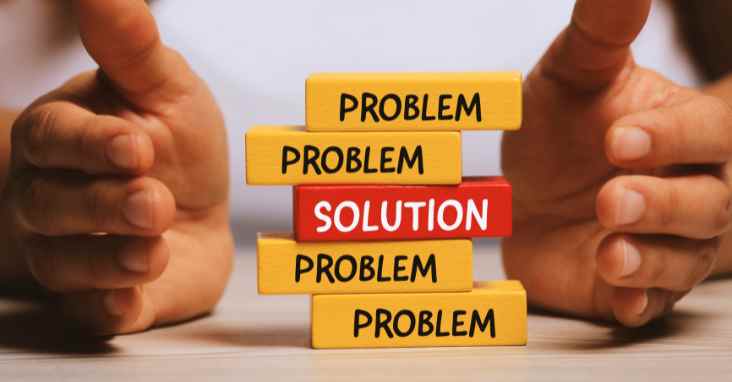Ah, the thrill of facing a problem head-on and emerging victorious! Every problem-solver, from a novice to a seasoned expert, knows this feeling. And if you’ve ever found yourself drowning in an issue, wondering why others seem to navigate it effortlessly, you might have noticed a common trait among them – they’re solutions oriented.
What does it mean to be “solutions or solution oriented person”? Is it just a modern-day jargon, or is there more to it? Picture this: Two people are stuck in a dense forest. The first one panics, thinking of all the wild animals, the cold night, and the uncertainty of getting out. The second one, while acknowledging these threats, starts thinking, “How can I climb a tree to see a way out?” or “Can I use the sun’s position to determine the direction?” The second person is a solutions oriented leader or solution oriented leader.
This mindset isn’t about denying problems or being unrealistically optimistic. It’s about focusing energy on: finding solutions, the right answers, learning, and adapting. It’s the difference between seeing a dead-end versus a detour. Being solutions oriented means constantly looking for avenues, even in seemingly impossible situations. It’s about resilience, innovation, and tenacity.
Solutions oriented means focusing on results, finding answers, no risks and relentlessly pursuing the best possible outcomes. Dive in to learn how to cultivate this mindset and succeed in any challenge.
In this guide, we’ll embark on an enlightening journey into the solution oriented mindset and other solution oriented approaches. We’ll delve deep into what it means to be solutions oriented, how you can cultivate this mindset, and the multifaceted benefits it brings to your personal and professional life. Whether you’re a young professional grappling with the challenges of the corporate world or a stay-at-home parent figuring out daily household conundrums, the solutions oriented mindset is your ally.
The world doesn’t stop throwing curveballs. What matters is how we catch them, or better yet, how we hit them back. So, tighten your belts, fellow traveler. By the end of this exploration, you’ll be armed with the tools, insights, and mindset to tackle any challenge that comes your way. Onward and upward!

Understanding A Solutions Oriented Approach
The term “solutions oriented organization” often pops up in corporate jargon, self-help books, and even casual conversations with business leader. But what does it truly encompass? Let’s dive deep into its essence and understand the fundamentals of this approach.
Defining “Solutions Oriented”:
Being solutions or solution oriented team goes beyond the simple act of solving problems. It’s an ingrained mindset, a holistic approach to challenges. Imagine life’s hurdles as a labyrinth. A solutions or solution oriented person doesn’t merely wander aimlessly, hoping for an exit. Instead, they meticulously study the maze, anticipate dead ends, and strategize their route.
Shift From Problem Focus To Solution Focus:
It’s easy for leaders to get trapped in a whirlwind of problems. They’re daunting, often overwhelming, and can cloud our judgment. However, the essence of a problem focused, solutions oriented approach is a steadfast, focused focus on the ‘how’ rather than the ‘why’. While understanding the root of the organization or problem is crucial, dwelling on it without forward momentum serves no purpose. The energy spent lamenting on a problem is better used crafting solutions.
Embrace The Learning Curve:
Every challenge you face is cloaked in lessons. When adopting a solutions oriented mindset, one understands that no challenge is void of value. It’s not about how many times you fall but how you rise after every fall, absorbing the lessons and ensuring the stumbles refine, not define you.
The Proactive vs. Reactive Dichotomy:
A reactive mindset waits for problems to arise and then scrambles to address them. It’s often associated with panic, hasty decisions, and short-term fixes. On the other hand, a proactive, solutions oriented mindset anticipates challenges and prepares for them. It doesn’t merely put out fires; it prevents them.
Continuous Evolution:
The world is in perpetual motion. What worked yesterday may be obsolete today. Being a solutions oriented leader means constantly updating your leadership toolkit, learning, unlearning, and relearning. It’s a commitment to evolution, ensuring you’re always equipped with the best strategies to tackle contemporary leadership challenges.
Key Points:
“Solutions Oriented” is a holistic, proactive approach to challenges.
Focus energy on crafting solutions rather than dwelling on problems.
Every challenge presents opportunities to learn and grow.
Anticipate and prepare for challenges instead of merely reacting to them.
Commit to continuous evolution to remain adept at handling new challenges.

Cultivating A Solutions Oriented Mindset
It’s crucial to recognize that a solutions oriented mindset isn’t a switch you can simply flip on. It’s a garden you cultivate, nurturing it with the right habits, perspectives, and environment. As you grow this solution oriented mindset, not only do you become adept at addressing challenges, but you also evolve as an individual. Let’s uncover the steps and practices to cultivate this empowering mindset.
Stay Curious – The Power of ‘Why’ and ‘How’:
Remember as a child, when every discovery was accompanied by a barrage of ‘whys’ and ‘hows’? This innate curiosity is the foundation of a solutions oriented approach. Instead of accepting things at face value, delve deeper. Whether you’re facing a problem or learning something new, always question the status quo. The quest for understanding drives innovation.
Accept Failures Graciously – Lessons in Disguise:
We’ve been conditioned to view failures as setbacks. In truth, they are invaluable lessons. Every misstep brings with it insights that textbooks and tutorials often can’t offer. By embracing failures, analyzing what went wrong, and iterating based on those insights, you fine-tune your approach and inch closer to effective business solutions.
Surround Yourself With Like-Minded People – Environment Matters:
Your environment, both physical and social, plays a pivotal role in shaping your mindset. Surrounding yourself with solutions oriented individuals ensures that you’re continually inspired, challenged, and supported. Their constructive feedback, diverse perspectives, and shared drive for solutions can act as catalysts for your growth.
Setting Clear Goals – The North Star:
A solutions oriented mindset thrives on clarity. When you have clear goals, it becomes easier to chart a path to achieve them and find solutions aligned with those objectives. These goals act as your North Star, guiding you through challenges and helping you maintain focus on what truly matters.
Develop Resilience – The Art of Bouncing Back:
Resilience is the bedrock of a solutions oriented mindset. It’s not about avoiding failures, but about how quickly and effectively you can bounce back from them. Cultivating resilience involves embracing discomfort, practicing patience, and understanding that the path to solutions will often be riddled with obstacles. Instead of being disheartened, view them as parts of the journey, honing your skills and resolve.
Continuous Learning – Keeping the Toolbox Updated:
In a rapidly changing world, resting on one’s laurels is a recipe for obsolescence. Adopt a learner’s mindset. Attend workshops, read books, participate in discussions, and always seek to expand your horizons. The more tools (knowledge and skills) you have in your toolbox, the better equipped you are to devise innovative solutions.
Key Points:
Nurture innate curiosity; question and understand the ‘why’ and ‘how’.
Embrace failures as rich learning experiences.
Your environment, including the people around you, can either foster or hinder a solutions oriented approach.
Set clear, actionable goals to guide your problem-solving journey.
Build resilience; it’s the backbone of facing and overcoming challenges.
Dedicate yourself to continuous learning to stay adaptive and innovative.

Software Tools To Boost Your Solutions Oriented Approach
In today’s digital age, it’s not just about having the right mindset but also about harnessing the right tools. While a solutions oriented approach is about your mental and emotional faculties, certain software tools can amplify your capacity to solve problems and create impactful solutions. These tools can help streamline processes, organize thoughts, and drive collaboration. Let’s take a closer look at some of these indispensable tools.
Trello – Visualize and Organize Your Ideas:
Trello provides a visual way to organize tasks, ideas, and projects. It’s based on the Kanban methodology and allows users to create boards, lists, and cards to prioritize and categorize tasks. For someone aiming to adopt a solutions oriented mindset, it’s vital to have clarity, and Trello offers just that. By visually mapping out tasks, one can identify bottlenecks, streamline processes, and foster collaboration.
MindMeister – Mapping Your Thoughts:
MindMeister is a collaborative mind-mapping tool. It’s fantastic for brainstorming sessions, organizing thoughts, and visualizing complex concepts. Whether you’re tackling a personal project or a business challenge, this tool helps lay out all facets of a problem, enabling a comprehensive solutions oriented approach.
Evernote – Centralized Note-Taking:
With Evernote, you can keep all your ideas, research, and notes in one centralized place. Its robust search capabilities ensure that you never lose track of crucial information. Being solutions and solution oriented leader often means collating information from varied sources, and Evernote helps you manage this seamlessly.
Slack – Enhancing Collaboration:
Slack is more than just a messaging app; it’s a hub for teamwork. For solutions to truly shine, collaboration is key. Slack provides channels for different projects, ensuring that conversations are organized and accessible. Integrated file sharing, third-party app integrations, and the ability to quickly search across conversations make it a powerhouse for collaborative problem solving.
Coursera – Continuous Learning and Skill Development:
Knowledge is power, especially in a solutions oriented approach. Coursera offers a plethora of courses from universities and institutions around the world, covering diverse topics. From critical thinking to technical skills, continuous learning becomes effortless with such a platform.
Asana – Task and Project Management:
For larger projects, especially in team settings, Asana shines bright. With a clean interface and robust features, it’s perfect for tracking team progress, delegating tasks, and ensuring that every team member is aligned towards a solution.
Key Points:
Trello aids in visualizing tasks, thereby bringing clarity to the problem-solving process.
MindMeister is invaluable for brainstorming and dissecting complex challenges.
Evernote ensures all your notes and research are organized and easily accessible.
Slack fosters effective communication, making collaborative problem-solving a breeze.
Coursera empowers individuals with knowledge, a cornerstone of the solutions oriented approach.
Asana is perfect for managing larger projects, ensuring everyone is in sync and geared towards a solution.

The Perks Of Being Solutions Oriented
Opting for a solutions oriented approach isn’t just a productive move; it’s transformative. While it’s evident that this approach offers an effective way to navigate challenges, the perks of a solution oriented leader and team extend beyond just problem-solving. They permeate various aspects of personal and professional life, creating ripples of positive change. Let’s delve into the multifaceted benefits of being a solutions oriented leader.
Boosted Confidence & Self-Efficacy:
When you consistently focus on finding creative solutions and witness your strategies turning into successful business outcomes, it naturally boosts your confidence. You start believing in your abilities, cultivating a sense of self-efficacy. This isn’t just about feeling good; it’s about knowing that you possess the skills and mindset to tackle challenges head-on.
Enhanced Resilience & Adaptability:
Challenges are inevitable. However, a solutions oriented approach equips you with resilience. When faced with setbacks, instead of succumbing to frustration, you see them as temporary roadblocks. This mindset fosters adaptability, allowing you to pivot and modify your strategies based on evolving circumstances.
Strengthened Collaborative Skills:
A solutions oriented lead individual understands the value of collaboration. By seeking diverse perspectives, brainstorming, and pooling together collective expertise, a team and solutions become more robust and holistic. This collaborative approach to leadership not only resolves challenges but also fosters a culture of teamwork and mutual respect.
Increased Value in Professional Settings:
In the corporate world, problem solvers are invaluable. By consistently showcasing a solutions oriented approach, you position yourself as an asset. Leaders and peers recognize and appreciate individuals who can transform challenges into opportunities, leading to career advancements and growth opportunities.
Promotion of Continuous Learning:
Being solutions oriented often means you’re on the lookout for knowledge, resources and skills that can aid in crafting solutions. This inherent curiosity and drive promote a culture of continuous learning, ensuring you remain updated, relevant, and ever-evolving, both personally and professionally.
Reduction of Stress & Anxiety:
Dwelling on problems can be mentally taxing, leading to increased stress and anxiety. However, when you shift your focus to developing solutions yourself, it brings clarity and a sense of purpose. Knowing that you’re taking proactive steps to address challenges can significantly reduce feelings of overwhelm and helplessness.
Inspiration to Others:
Your approach to challenges doesn’t just benefit you; it serves as an inspiration to others. By modeling a solutions oriented mindset, you motivate those around you to adopt similar strategies, creating a ripple effect of positive problem-solving.
Key Points:
A solutions oriented approach cultivates confidence and a belief in one’s abilities.
It fosters resilience and the ability to adapt to changing scenarios.
Enhances teamwork and collaboration, making problem-solving a collective effort.
Positions you as a valuable asset in professional environments, paving the way for growth.
Champions continuous learning, ensuring personal and professional evolution.
Acts as a buffer against stress, promoting mental well-being.
Serves as an inspiration, motivating others to become solution seekers.

FAQ – Unraveling the Solutions Oriented Approach
Navigating the world with a solutions oriented mindset can be a rewarding journey, but like any paradigm shift, it comes with its own set of queries. Here are some frequently asked questions to provide deeper insights and clarity.
Isn’t focusing solely on solutions too simplistic?
No, it’s not about oversimplifying problems. A solutions oriented approach encourages diving deep into challenges to understand their intricacies. It’s about shifting focus from merely highlighting issues to actively brainstorm solutions more problems and seeking ways to resolve and solve whatever problem arises from them, ensuring a balanced perspective that acknowledges complexity while seeking resolution.
How can I differentiate between being solutions oriented and just being optimistic?
While both traits can overlap, they are distinct. Being optimistic means maintaining a positive outlook regardless of circumstances. A solutions oriented individual, on the other hand, couples this positive outlook with actionable strategies. They don’t just hope for the best; they actively work towards the best outcome.
Are there situations where this approach might not be ideal?
Every approach has its context. While a solutions oriented mindset is beneficial in many workplace scenarios, there are moments, especially in personal or emotional situations with clients, where simply listening and empathizing is more appropriate than immediately jumping to solutions.
How do I deal with individuals who are resistant to solutions?
Resistance can stem from fear, skepticism, or past experiences. It’s essential to communicate effectively with leaders, empathize with their concerns, provide feedback, and sometimes even showcase small wins or proofs of concept to build trust and demonstrate the viability of proposed solutions.
Can this approach be taught or is it innate?
While some individuals might naturally gravitate towards problem-solving, a solutions oriented approach can definitely be cultivated. Through practices like continuous learning, seeking feedback, and fostering resilience, anyone can develop and hone this mindset.
How does one avoid getting overwhelmed when seeking solutions?
It’s crucial to break challenges down into smaller, manageable parts. Tackling each aspect step by step not only makes the process less daunting but also allows for clearer, more targeted solutions.
Is it possible to be too solutions oriented?
Balance is key. While being proactive is commendable, hastily jumping to solutions without fully understanding a problem can be counterproductive. It’s essential to strike a balance between analysis and action.
How can I measure the effectiveness of my solutions oriented approach?
Feedback is invaluable. Regularly seek feedback from peers, superiors, or those affected by your solutions. Additionally, self-reflection and tracking the tangible outcomes of your strategies can provide insights into areas of improvement.
Can this mindset be applied to personal challenges as well?
Absolutely! From personal development goals to interpersonal relationships, a solutions oriented approach can offer clarity, direction, and constructive strategies to navigate challenges.
Are there any risks associated with this approach?
Like any approach, there’s no one-size-fits-all solution faster this. There might be instances where a proposed solution doesn’t pan out as expected. It’s essential to be adaptable, learn from such experiences, and iterate your solution accordingly.
Key Points:
The solutions oriented approach is not about oversimplification but rather a shift in focus towards actionable strategies.
It differs from mere optimism by coupling a positive outlook with actionable steps.
This mindset is flexible and can be applied in a variety of situations, both personal and professional.
It can be cultivated, and continuous feedback and reflection are vital to its effectiveness.
Balance is key; understanding problems thoroughly before proposing solutions is crucial.

Conclusion
As we’ve journeyed forward through the facets of a solutions oriented mindset, it’s evident that this is not merely a methodology but a transformative way of living. Embracing such an approach reshapes the way we perceive challenges, turning them into opportunities waiting to be unlocked.
Historically, humankind’s greatest advancements have stemmed from an innate desire to explore and find solutions. From the wheel to the World Wide Web, our legacy is paved with examples of transcending barriers through innovative solutions. And while the scale of these solutions varies, the underlying principle remains constant: a focused drive to better our circumstances.
But why does this solution oriented approach resonate so deeply? For one, it provides a sense of purpose. In a world inundated with challenges, both big and small, it’s easy to feel overwhelmed. However, a solutions oriented mindset reframes these challenges, giving us a mission and a sense of direction. Instead of being bogged down by problems, we become architects of change, actively crafting strategies to improve our world.
Moreover, this mindset fosters personal growth. Every time we face a challenge with a solutions oriented approach, we grow — in skills, knowledge, and character. We learn the art of resilience, the power of collaboration, and the value of continuous learning. It’s a journey of self-improvement, where every challenge faced is a lesson learned.
Additionally, this approach transcends the personal sphere. By being solutions oriented, we inspire those around us. It’s contagious. Teams work more cohesively, communities come together, and positive change becomes a collaborative whole team effort.
In essence, adopting a solutions and solution oriented leadership mindset is akin to lighting a beacon in the face of adversity. It illuminates paths that might otherwise remain obscured. It offers hope, not just through hollow optimism, for example, but through actionable strategies that promise to lead to tangible change.
As you move forward, armed with this newfound understanding, remember: challenges are but puzzles waiting to be solved. And with a solutions oriented approach, you hold the pieces that can craft the future into a brighter, more promising picture for future you.















